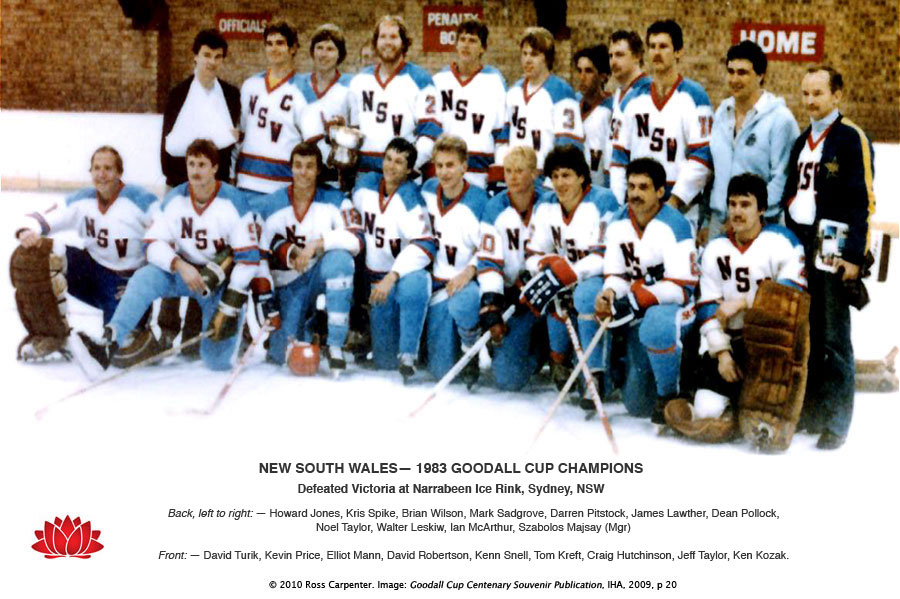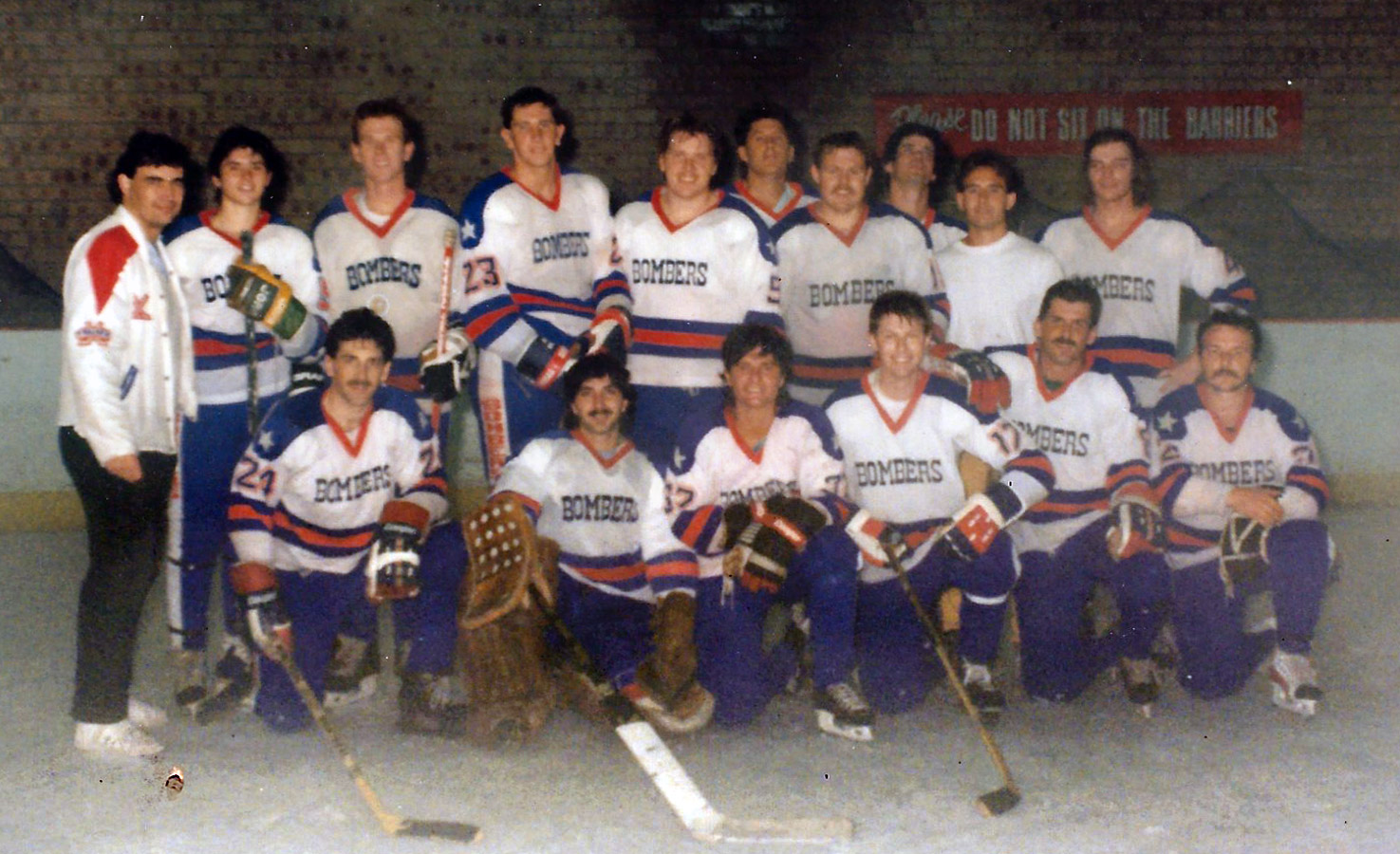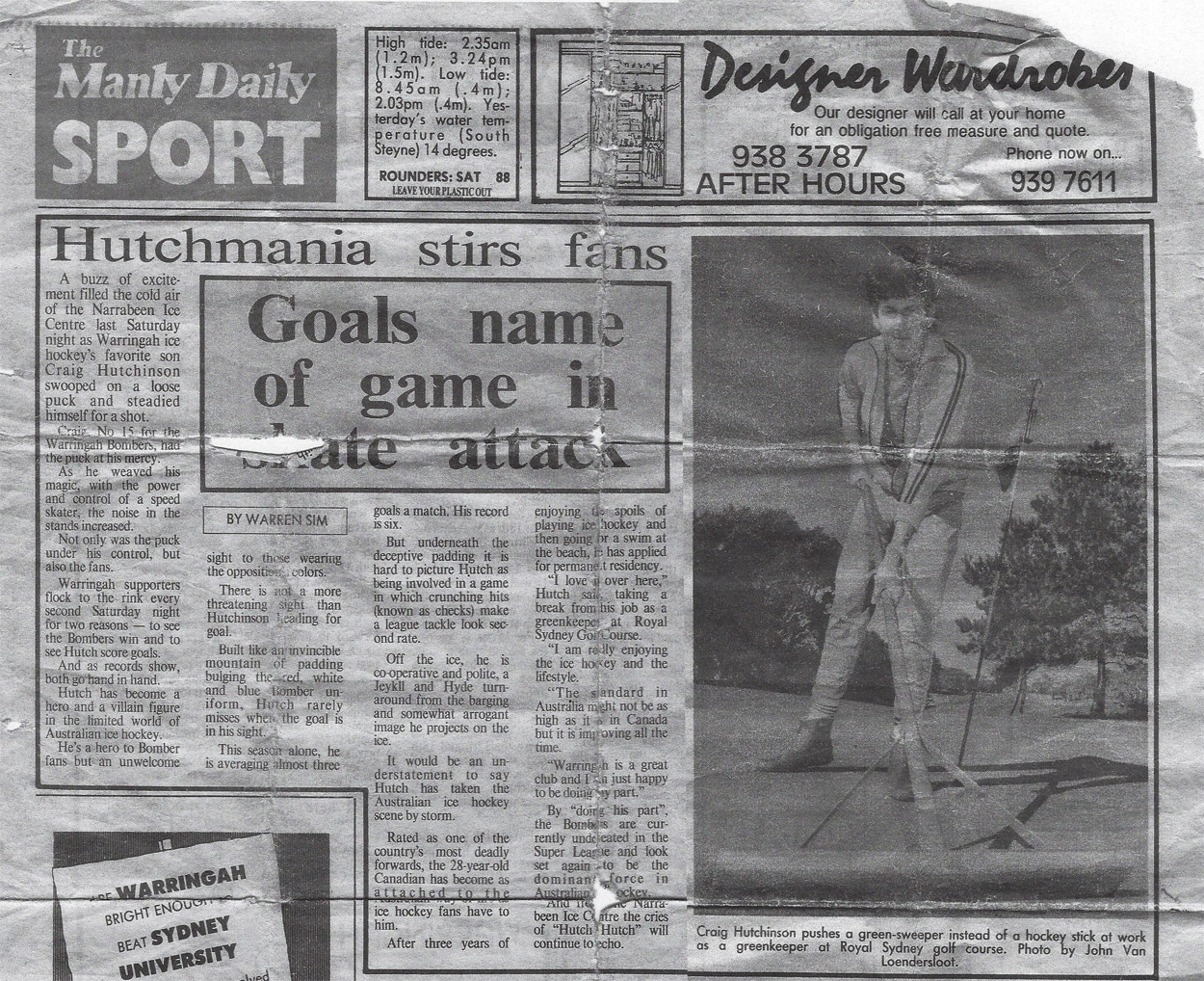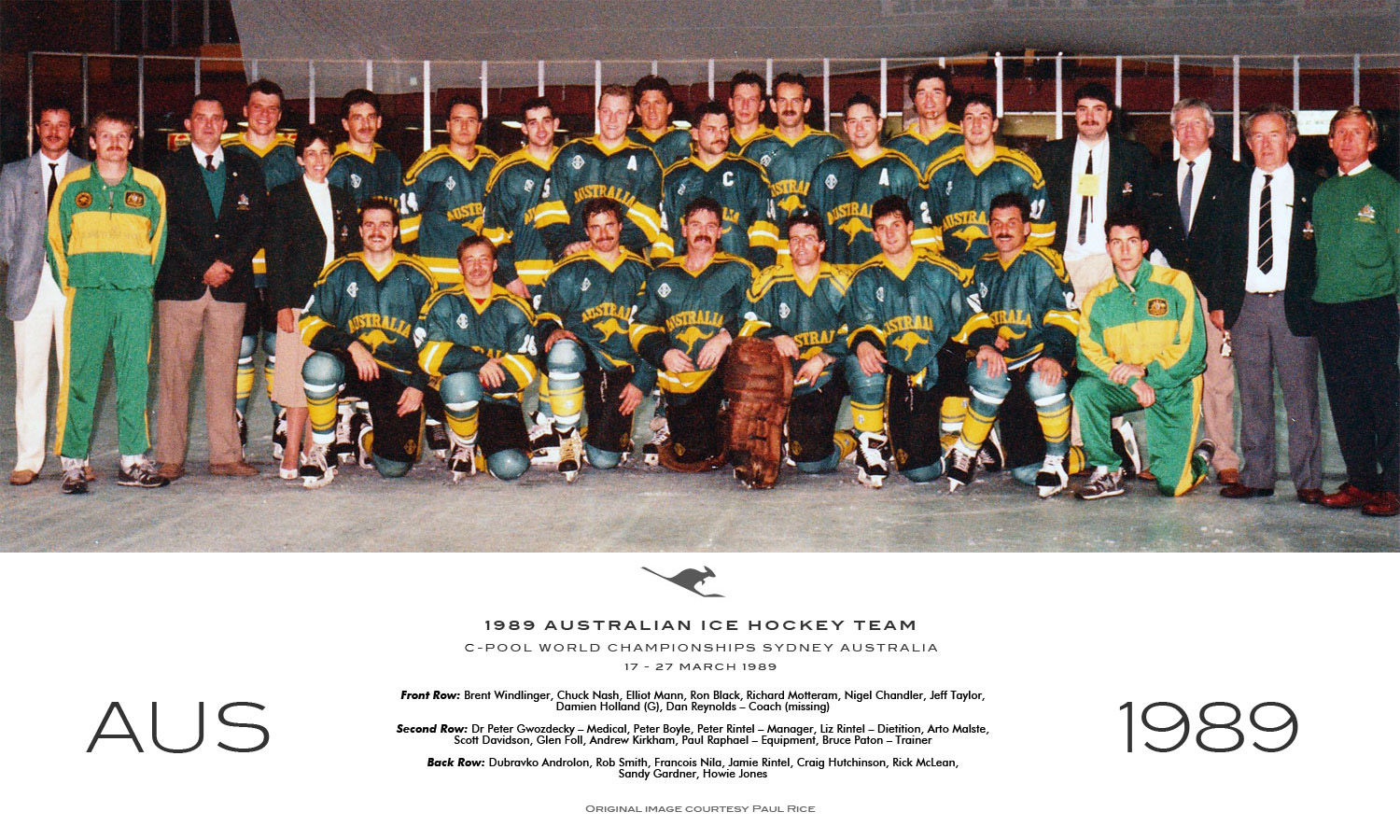
NO. 15 FOR THE BOMBERS VERSUS CANBERRA KNIGHTS, WARRINGAH ICE SKATING CENTRE, NARRABEEN, SYDNEY, MID-1980s
Canadian Sniper
Craig Hutchinson and the six-goal game
![]() As a kid growing up, hockey was everything. I spent hours practising my wrist shot in the basement and was always playing road hockey with a tennis ball and skating all the time on lakes, outdoor rinks or public skating.
— Craig Hutchinson, Perth, June 2018. [1]
As a kid growing up, hockey was everything. I spent hours practising my wrist shot in the basement and was always playing road hockey with a tennis ball and skating all the time on lakes, outdoor rinks or public skating.
— Craig Hutchinson, Perth, June 2018. [1]
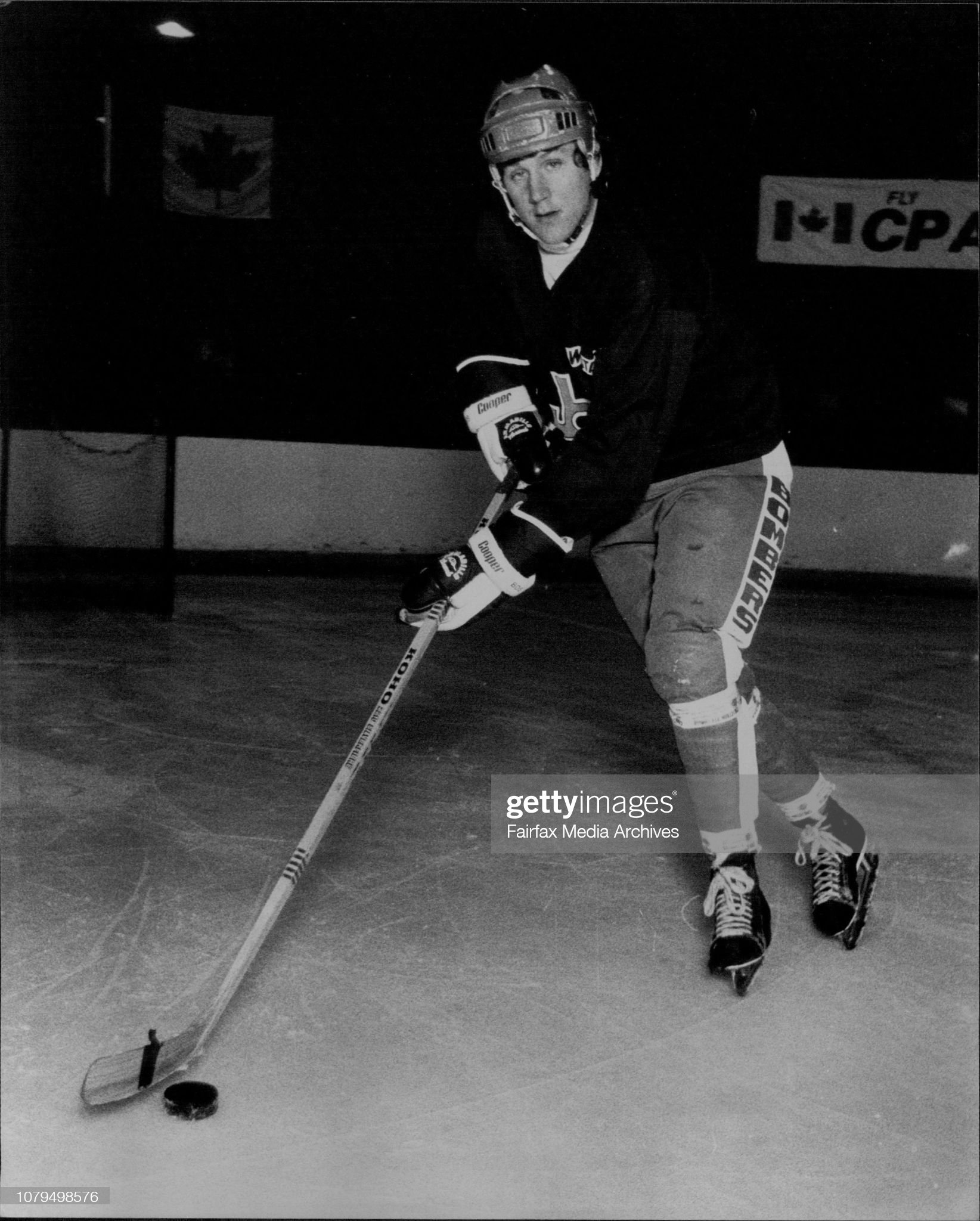 Hutchinson, Sydney, 20 June 1983. (Photo by Joanna Bailey/Fairfax Media via Getty Images) [9]
Hutchinson, Sydney, 20 June 1983. (Photo by Joanna Bailey/Fairfax Media via Getty Images) [9]
OUTSIDE OF WILLIAMS LAKE, British Columbia, where the logging begins in earnest, the land turns suddenly to the deepest sort of country, with no hint of the city that stands nearby. The birthplace of Craig Hutchinson lies amid the sawmills and logging trucks of Cariboo country, 340 km north of Vancouver. He is a retired ice hockey sniper and, like his military counterparts, some say he does not want to be found. Ice hockey is a game that also excites a fringe of pretenders.
His father Gary, a mechanic for one of those mills, descended from a long line of Cariboo pioneers. His grandparents Harry Curtis and Julia (Dussault) were Shuswap people. A gifted, lifelong athlete, Gary excelled at many sports and his love of hockey and his skill as a player are well-known at Williams Lake. He played centre and defence with the Junior Pontiacs and the local senior team, The Stampeders, for over 20 years. [10] On Canada Day weekend, the city hosts the second biggest rodeo in Canada after Calgary.
Hutchinson said, "Dad was a tough as nails defenseman who liked getting into fights. But he also liked reminding people how he once scored 3 goals in 47 seconds". [1] Gary died last year at 86, survived by his wife Carole, the granddaughter of R C Cotton, a pioneer rancher from Riske Creek. [10]
Hutchinson does not look like a fighter. But you never know it about someone. You can't tell in advance. The guys with the look and the strut, a lot of the time they're hiding. He started skating at 3 and played minor hockey from the age 5. He can still remember minor hockey as a kid, especially the day he took a bad slash to the arm that left him barely able to hold a stick. He told his father he could not play the next game, but Gary would have none of it.
"Your teammates need you out there. We’ll strap your arm and you’ll play". He could not do much at all through the game, but in front of goal in the last few minutes he managed to poke a loose puck under the goalie for the game winner. "Even though you were injured and couldn’t do much," said his father, "you still helped the team". That stayed with him. The team, not the individual.
"As a kid growing up, hockey was everything," said Hutchinson. "I was always playing road hockey with a tennis ball and skating all the time on lakes, outdoor rinks or public skating". Then there was Hockey Night in Canada at 5pm every Saturday. "As a kid my favourite player was Bobby Orr from Boston Bruins, I can still remember his end-to-end rushes up the ice. I watched Wayne Gretzky play his first world junior championship, he was 16 and I was blown away at his skill level".
At 17, his last year of high school, he followed in his father's footsteps and played one season for The Stampeders. A boy among men on a bus between towns. He won Rookie of the Year, sparking the interest of Junior A teams and the Kelowna Buckaroos scouts. He met Darrell Becker there at Kelowna and they became good mates. The University of British Columbia scouted him in his first season.
The UBC Thunderbirds were an excellent team. Hutchinson knew it would be a tough line-up to crack, but he signed-up for a degree while playing hockey. He played 3 or 4 games, then spent the rest of the year with the Junior Thunderbirds, who also had a good team.
Still today, UBC's junior program aims to develop AA players into AAA players. "We were on the ice every day," he recalls, "and the hockey program was very professional. I studied physical education and really enjoyed life at Uni. The second year I still didn’t make the top team and played junior varsity".
A PALL OF SMOKE rising over suburban Sydney in 1982 was all that remained of Australia's National Ice Hockey League. From its ashes rose the New South Wales Super League and a professional Super League in the rival state of Victoria with 45 overseas players. Locals liked to refer to the NSW league as the national league, despite the fact that its clubs came from an area defined by a single state boundary.
In the previous two years, six Canadian teams had made the trans-Pacific trip, with four more still to come. Then player registrations rose 66 percent to a new total of 3500 nation-wide. Roughly 35 percent were North Americans, and all but a handful were Canadians. The papers said none were pros, but that was unlikely. [5]
Down south in Victoria, the rival state faced a year of challenges, "far beyond the normal expectations," according to Vic Ekberg, the embattled state president. The loss of St Moritz and Ringwood in the city, and the birth of Ballarat Iceland in the country, [8] the pro league shut down in its first season. Too violent, "... full of rough neck Canadians," said the national secretary, Sandi Logan. "They were drawing blood to draw the crowds." [7]
"In 1982 my sister was living in Sydney, Australia," said Hutchinson, "and phoned and said there was a hockey league there and would I be interested in coming for a season. So I decided to take a gap year from uni and go and experience Australia". A two-year sports visa brought Hutchinson Down Under.
In his prime at 25, he played Centre for the Canterbury United club in the newly formed Super League from March 1982. [3] Canterbury finished runners-up to the Warringah Bombers who amassed a streak of 27 games unbeaten. [11] He also represented the state in the Goodall Cup won by Victoria at Skateworld Gold Coast in September, their last for almost thirty years.
Hutchinson stayed for the 1983 season, one of about forty-five young North American hockey players, almost all of them Canadians. A small increase on the previous year. "They're junior college players, mostly," said Logan, "and some have such a great time they stay for two or three years". There had been no a national team for two years while officials focussed on preparing the national junior team to compete in the 1988 Winter Olympics. [5]
The Warringah Bombers, the reigning champions of the now defunct NIHL, approached Hutchinson and he left Canterbury for the stronger team. Dick Mann, who founded the club with a group of migrants in the 1950s, also owned its headquarters, the Warringah Ice Skating Centre. Five hundred people usually showed up to see Sydney's oldest ice hockey club, said Mann, with capacity crowds of "over a thousand" for the playoffs. [5]
Hutchinson played on a line with Jeff Taylor, and they clicked straight away. "Jeff was a great passer of the puck, with great on-ice vision," he said. "He could score goals as well. I really liked playing with Jeff, it was a lot of fun". Before he moved to Australia, Taylor played 2 years with the Brandon Bobcats alongside Mike Johnston under coach Andy Murray, both of whom went on to the NHL. He was MVP and second in scoring in his last year at Brandon.
"We had Dave Turik in goal who was an incredible goalie," continued Hutchinson. "He stopped a lot of rubber. In defence we had Jim Fuyarchuck, Mark Sadgrove, Chris Taylor and Terry George, who sadly passed away. We had a really talented core of Aussies in Darren Pittstock, Jaime Lawther, Chris Spike and Elliott Man".
The Bombers finished on top of the standings after 32 games, followed by the Canberra Knights, the Macquarie Bears, the Sydney Icemen and Canterbury United. Hutchinson's first season at Warringah produced 29 wins and 3 losses. Their nearest rival, the Knights, finished with 18 wins, 13 losses, and a tie. The Bombers won eleven more games.
They did it with 253 goals, an average of almost 8 goals a game, while allowing just 80. A few years earlier, they scored 191 goals and allowed 73 against. [11] The difference between the top and bottom of the new Super League was almost a factor of five. The Kelly Memorial Trophy for the Most Valuable Player went to the Bombers', Mark Sadgrove, while teammate, David Turik, won Best Goaltender. [4]
Hutchinson averaged 2.7 points a game for 87 points (38-49), yet lost the Top Point Scorer title by just two points to the Bears' Dean Pollock. Jeff Taylor finished third on 78 points (29-49), and equal top on assists with Hutchinson. The Bombers were deep, producing five more of the top-20 scorers — Kris Spike (30-28), Brian Wilson (25-29), Jamie Lawther (18-23), Darren Pitstock (19-13) and Howie Jones (10-21). This combination, observed Hutchinson, made for an excellent hockey team.
"We had a great supporter base," he said, "and we used to fill the arena on Saturday nights and then head off to the "Antler" for after game drinks. I was living in the eastern suburbs and working at the Royal Sydney Golf Club, so I did a lot of driving in those five years". On the ice he was "built like an invincible mountain of padding bulging the red, white and blue Bomber uniform. There was not a more threatening sight than Hutchinson heading for goal". [2]
NSW and the ACT battled out the 1983 Goodall Cup final at the Bomber's hangar at Narrabeen. The national association had by then restricted the number of imports to five men per team, down from eight, and it dropped to four the following season. Hutchinson represented NSW and won the trophy. The state campaigns for the Goodall Cup were one of the highlights of his career. "It was a real honour playing with all the best players in our league".
That year, the Super League also attempted to break into television with teams from Sydney, Canberra, Adelaide, Melbourne and Brisbane. The modified ice hockey format of the Slapshot series proved another highlight for Hutchinson. "It was televised so that made it special," he said. "A really good advertisement for Australian Ice hockey". The ABC used highlights of two 20-minute periods refereed by Rick Williams, with commentary by Gordon Bray and Sandi Logan. Hutchinson and Taylor made the All-Star team on the wings of Becker, with Turik in net, and Jim Fuyarchuk and Pohjola in defense.
Hutchinson had no difficulty extending his two-year visa when it expired in March 1984. "I never did complete my physical education degree at UBC". Although the number of imports allowed to a team had just reduced from eight to five, the International Ice Hockey Federation still regarded five too high. [3] But national president Phil Ginsberg said, "Five years ago I would go into a dressing room and find kids drinking rum, cigarettes hanging out of their mouths, about to go on the ice. It knocked me right out. But now we've got it together".
The national secretary still spoke seriously of qualifying a team for the 1988 Olympics in Calgary, twenty years on from when Australia was last eliminated from Olympic qualification. The number of imports in the NSW Super League would drop to 4 by then. "In three years, we'll be standing on our own feet," said Ginsberg. [6] Hutchinson was the 1984 regular season top point scorer and League MVP.
"The year we travelled to WA (the 1985 Goodall Cup) was my first look at Perth and I really liked the city. I can remember we came up against WA in the final; we had 15 players and 2 lines. They had 22 players and 4 lines. I think they were confident in beating us, but we ended up winning, which was a great memory". Hutchinson won the John Nicholas Trophy, the Goodall MVP, and his third straight Goodall Cup.
By the mid-1980s the Super League was a strong comp with Canberra, Macquarie and Warringah maintaining the higher standard. Yet, by the early-nineties, it fell on hard times, some clubs less and less able to compete, dropping in and out as the years went by, and really struggling by 1994 as the newly renamed East Coast Superleague.
No 15 had become Warringah's favourite son. He used the power and control of a speed skater to swoop on loose pucks and bury them with a wrist shot perfected by hours of practice in the basement back home. [1] He rarely missed when the goal was in his hairlines. Bombers fans flocked to the hanger every second Saturday night for two reasons — "to see the Bombers win and to see Hutch score goals". As the record shows, both went hand in hand. The local rag called it Hutchmania. [2]
He played five seasons with the Bombers all up, winning three championships. Then in 1988-89, just before the League decline, he left his job as a greenkeeper at Royal Sydney golf course to move to Perth. "The WA Hockey Association was very welcoming and was happy to have me come over. I played my last 7 or 8 years in Perth. The first few with The Pirates and then The Bombers. We won a few championships with the Bombers with Darrell Becker as coach. It was great having his hockey knowledge guiding the team".
In 1988, Hutchinson played for Australia against Teen Ranch, a team of Christian hockey players with a few past NHL stars, such as Gary Unger. "I can remember watching these players when they played in the NHL. It was a real thrill playing against them. A great memory". The Australian Senior Team needed competition in the lead-up to the C-Pool Worlds to be hosted in Sydney the next year, and the President's Bicentennial Ice Hockey Championship provided it.
An upset victory to Australia 3-2 against the visiting US side early in the championship assured Australia a place in the grand final against the touring Teen Ranch team. Australian captain, Dave Allen, shot the winning goal in the last second of the game. In the tense, tightly fought consolation final, the Canberra Knights narrowly lost 3-2 in a shootout against Iowa State Cyclones after a scoreless 5-minute overtime.
In the grand final, the determined Australian team went down 4-1 to the Canadians. The game was close until the last two minutes when Teen Ranch scored two goals. The best performances came from Victorian netminder, Ron Black, and Hutchinson and Allen, both from Western Australia. Former NHLer Dave Burrows (Pittsburgh Penguins, Toronto Maple Leafs) led Teen Ranch, with brilliant goaltending by Dave Tataryn (New York Rangers and Toronto Toros) who kept Australia at bay.
In 1989, Hutchinson represented Australia at the C-Pool Worlds in Sydney. "We played Holland and I can remember they were a very skilled team and beat us quite easily. We also played Bulgaria and that was a great experience, but to wear the green and gold colours was a real honour for me. I can still remember opposition players like Chuck Naish and Glen Foll because we were all from Canada, we formed a special bond. I met Rob Johnson here in Perth; he was a great guy and great hockey player". Relegated back to Pool-D at home, Australia's fortunes dipped, but Hutchinson scored 3 goals and 3 assists from Left Wing.
He decided to retire from hockey when he was 38 or 39 to play tennis. "My speed on the ice was not what it used to be," he recalls, "and I was starting to receive a lot of body contact. I had a family by then as well, my wife Ellana and two kids, Jacinta and Brett who is named after Brett Hull, the son of the great Bobby Hull of the Chicago Blackhawks".
Hutchinson says he really enjoyed playing, and loved the Aussie lifestyle. "It means a lot to be remembered as one of the top players back then. I still remember all the fantastic road trips, fun and parties after the games. Because hockey is a team sport, you really develop special bonds with teammates, which can form lifelong friendships". These memories enriched his life.
In the years that followed, his old club, the Warringah Bombers, became committed to developing younger players from a very young age, training them alongside their aging Super League players, and even touring teams overseas in Canada and the USA. At one time they recruited 9 and 10 year-old students at Narrabeen Sports High, and discussed introducing ice hockey into the school program. [9]
A CITY OF WHITE SKYSCRAPERS and pale green glass, blue skies and an even bluer Swan River, laid-back and livable Perth had wonderful weather, beautiful beaches and an easy-going character in the Eighties. Although ice hockey began there in a converted picture theatre in the Fifties, interruptions continued until the first competition-size rink opened in the northern suburb of Mirrabooka, the year Hutchinson and the Super League arrived in Sydney. Hockey's Cinderella state soon became a destination for more notable overseas players. Dave Bernhardssen, Dave Allen and Darrell Becker all arrived via the Eastern states.
Still there in 2018, Hutchinson is co-operative and polite. No trace of the "Jekyll and Hyde turnaround from the barging and somewhat arrogant image he projects on the ice". [2] Loved by the Bombers, hated by the rest, his hero and villain archetype is long gone from the limited world of Australian ice hockey. Attached to fans as much they were to him, the man once rated as one of the country's most deadly forwards has come to rest. He now has a grown-up family.
The distant executioner drifts back to distant memory. Talk turns to Alex Ovechkin and his blistering shot, hopes of the Caps winning the Stanley Cup over the Vegas Knights. Hutch would be pleased the Caps won with Australia's Nathan Walker in the depth line-up of the final.
"The Australian game is getting better," he confides. "I go and watch the Perth Thunder play sometimes and I am really impressed with today's standard. The Aussie players are really improving and with the Aussies playing NHL now, it should inspire other young Aussies to dream big and make it to the top. I would love to see an Aussie play for my favourite team the Vancouver Canucks. That would really blow my mind.
"I still go back to Canada every year in August to visit my mum who is 86 and sister. My dad died last year, so I’ve got a few pictures of his hockey days which are nice to have. I also brought back his golf clubs as well. I still love Canada with all the beautiful scenery and mountains. But I really love the nice weather here in Perth. My daughter Jacinta now lives in Vancouver, working for a film production company. They make a lot of movies in Vancouver now, they call it Hollywood North.
"I was lucky to catch a few Edmonton Oiler games and see Connor McDavid play and was so impressed. His sheer speed really stands out. He'll be at the top of the game for many years to come. My favourite team The Vancouver Canucks have a young guy, Brock Boeser from the USA who scored 30 goals as a rookie. He's got an outstanding quick release shot".
A few years ago, Hutch played an over-50s tournament in Perth, his first competition hockey for 9 or 10 years. "It was amazing how it all came back," he said, "the stick handling and shooting the puck. There was no contact so that definitely made it easier. I managed to score a few goals and help WA win. It was great to see some past players I had played against in Sydney. Peter Nixon was there from Queensland, so that was a real buzz to catch up after all those years".
Even at UBC, with opportunities in Canada he did not pursue, Hutchinson was a great skater and capable of magical things on the ice. He became an entertainer instead, with both the puck and the fans under his control. In the halcyon years, he averaged almost three goals a match, and his personal best was six. [2] The impression he created was so indelible for some, cries of "Hutch Hutch..." still echo down the corridors of three decades. He took the Australian ice hockey scene by storm, although a whole generation has since sprung up who have probably never heard of him. "I never say never," says the Canadian sniper, "to getting back on the ice".
With special thanks to Wendy Ovenden, Karen Sommerville and Ellana Hutchinson, without whose help the story may not have been penned.
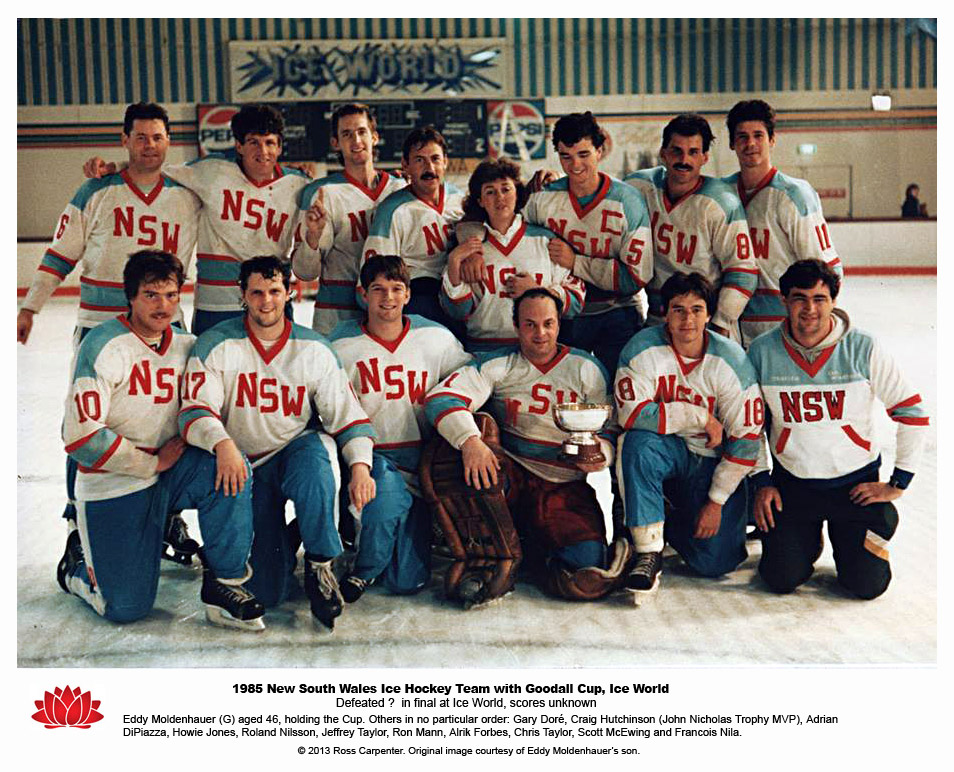 Standing second from left, 1985 Goodall Cup Champions, Perth, Australia, 1985. [9]
Standing second from left, 1985 Goodall Cup Champions, Perth, Australia, 1985. [9]
[1] Biographical notes, Craig and Ellana Hutchinson, June 2018
[2] Hutchmania stirs fans, article, Manly Daily, Sydney, Australia, undated c1986.
[3] The Sydney Morning Herald, Saturday, June 25, 1983, p 34
[4] 1983-4 NSW-ACT Super League Stats, Birger Nordmark Archive
[5] Alien sport of ice hockey gains Australian beachhead, Chris Pritchard, Special to The Christian Science Monitor May 17, 1982
[6] Beach Party Hockey Style, National Hockey League Magazine, Nov 1984. Courtesy Birger Nordmark.
[7] The Ice Man, article, Penthouse Magazine, 1983.
[8] VIHA President's Report, Vic Ekberg, 1982. Paul Rice.
[9] Ice Hockey's Cool, Sheridan Kelly, Manly Daily, 1985.
[10] Gary Stirling Hutchinson, Obituary, The Williams Lake Tribune, Feb 25 2017.
[11] Newsletter of the Warringah Bombers, Sep 11 1982.

